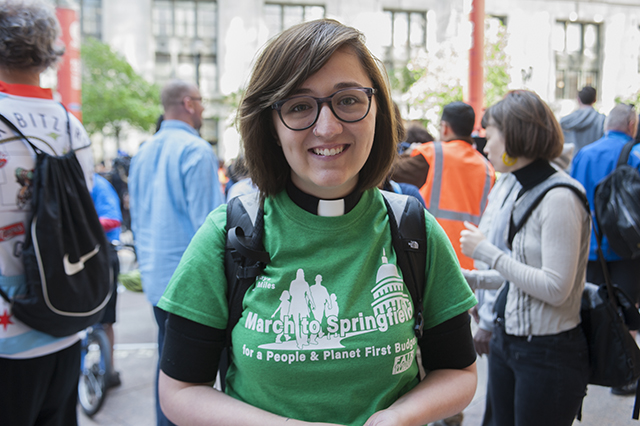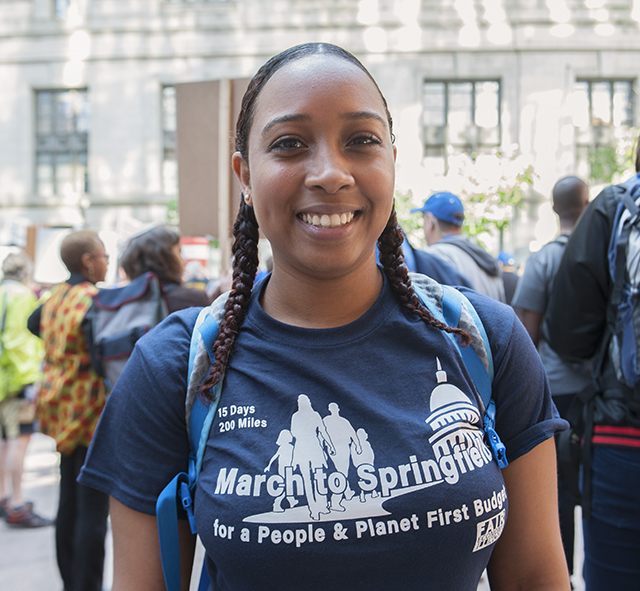These Activists Will March 200 Miles To Springfield Over The State Budget
By aaroncynic in News on May 16, 2017 7:18PM
A group of activists embarked on a 200 plus mile march on Monday from Chicago to Springfield to highlight the state’s budget impasse as well as their ideas for solutions to the ongoing crisis.
A few hundred gathered at the Thompson Center in the late morning for a rally and short march to see off a smaller group of which will make the journey to the State Capitol over the next 15 days, arriving a day before the legislative session in Springfield adjourns. The “through marchers,” those who plan to do the entire trek which will run parallell to Interstate 55, range in age from 23 years old to 90. The group has planned multiple “listening stops” along the way where they hope to engage members of communities they will pass through, and has encouraged people and made preparations for those who wish to join them - even if they can’t complete the entire route.
Fair Economy Illinois, a coalition of groups who put the march together, is pushing what they call a “people and planet first” budget—a mixture of investments in infrastructure, social service programs, higher education, healthcare, and pension funding coupled with revenue building initiatives to fund them. In addition, organizers are calling for legislation that would create a $15 statewide minimum wage and protections for immigrant and marginalized communities.
“I have a mountain of student debt that doesn’t need to be there and my family has been affected by high health care costs,” said Samantha Nichols, a 24 year-old student at the Lutheran School of Theology in Hyde Park. Nichols, whose brother was born with a serious medical condition and who also suffers from asthma—one among many pre-existing conditions insurance companies would be allowed to charge higher premiums for under the GOP’s proposed replacement to the Affordable Care Act— said both her faith and personal situation ‘called her’ to march.

Samantha Nichols, a 24 year-old activist marching from Chicago to Springfield over the state's budget crisis. Photo by Aaron Cynic.
“I feel called to advocate to those who don’t have the resources and programs they need and a lot of these resources and programs that our people and planet first budget would fully fund are near and dear to my heart and own experience,” said Nichols. “When I think about the situations that people all across the state find themselves in, the situations I’ve been in, my family has been in, it all goes back to whether or not our government is willing to invest in people and planet instead of capitulating to major corporations, I can’t help but be moved and called to march to Springfield.”
Organizers say Illinois is in such dire fiscal straits due to policies that prefer the ultra-rich and corporations over average citizens.
“Illinois has one of the most regressive tax structures in the country: most corporations pay no income tax to the state, and billionaires pay the same income tax rate as senior citizens on social security,” said Fair Economy Illinois in a statement. “Illinois is a microcosm of what’s in store for the nation under the Trump tax plan: Public education, infrastructure and the social safety net are in shambles.”
Alex Muhammad, a 27 year-old woman from Park Forest, whose mother cares for her grandmother and sister, is currently unable to work due to an injury she suffered due to domestic violence, said by enacting the group’s budget plan, the thousands of families across Illinois that rely on a razor-thin safety net would benefit.

Alex Muhammad, a 27 year-old activist marching from Chicago to Springfield over the state budget crisis. Photo by Aaron Cynic.
“It’s been so difficult because we’re told the state is broke, which is not true,” said Muhammad. “Large corporations and the super wealthy haven’t been paying their fair share of taxes. If we did close corporate tax loopholes, put a small tax on LaSalle Street transactions, we could provide those things we think are common sense that people deserve, especially for the most vulnerable and most vulnerable communities.”
"Dental/mental health care are necessities, should not be treated like bonuses," says Rey, a Medicaid recipient #MarchToSpringfield #twill pic.twitter.com/uSS7h0iucZ
— Aaron Cynic (@aaroncynic) May 15, 2017
Alfred Klinger,” a 90 year-old World War II veteran said investing in programs to lift the average Illinoisan creates more opportunities for residents to contribute.
“When I was young, rich people and corporations paid their fair share of taxes, and government used that money to invest in people,” said Klinger. “The GI Bill paid for me to go to medical school, allowing me to serve my community as a physician for 45 years. Government should make these kinds of big investments in every generation.”
#MarchToSpringfield coming up on CBOT/CBOE #twill pic.twitter.com/LG2DInQ5ZT
— Aaron Cynic (@aaroncynic) May 15, 2017